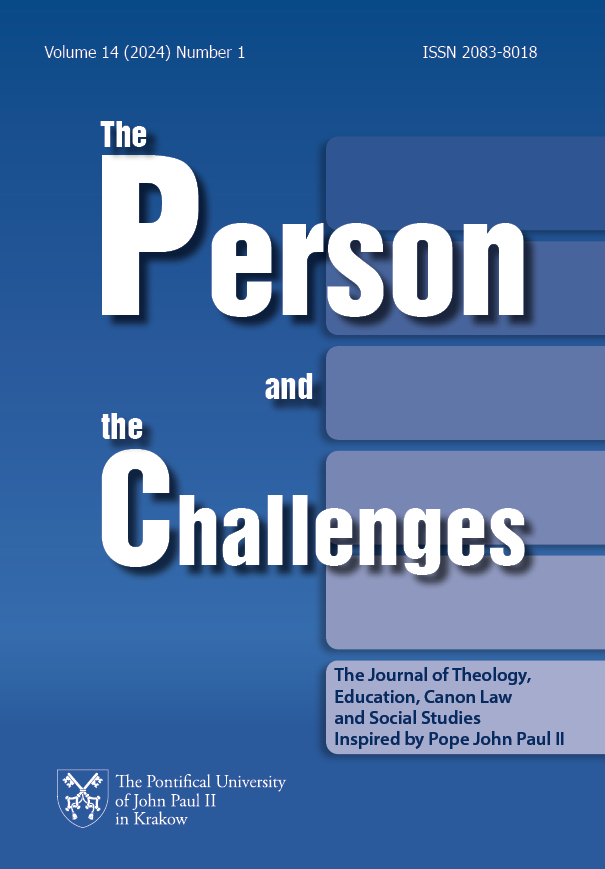St. Peter, Church and Religion as a Role Model for Modern Entrepreneurs
DOI:
https://doi.org/10.15633/pch.14117Słowa kluczowe:
St. Peter, religion, spirituality, organization, management, young entrepreneursAbstrakt
Modern enterprises operate on the basis of the Industry 4.0 paradigm. Technology is becoming an inherent attribute of the economy, but at the same time, one should bear in mind the employees, who create enterprises, and the spiritual side, so as to maintain a balance between what is tangible and intangible. Religion and spirituality are intertwined and have an impact on business practice and corporate management. Research on a group of young people has shown that faith plays a vital role in running a business. Moreover, the sustainability and uninterrupted activity of the Church can be a model for many companies. Subordinating one’s own affairs and individual ambitions to the common good and higher values, is the direction which managers of modern institutions can follow. Such an enterprise needs a leader, a charismatic leader who, as an intangible asset, will primarily see the value of the employees entrusted to him, and only then, the material value of the company. The personnel function and the humanistic approach are the key aspects of a well-functioning enterprise. The article analyses the role of St. Peter in managing the Church, and indicates the possibility of managing modern enterprises based on Church experience.
Bibliografia
Barbato M.P., Geopolitics of Papal Traveling: (Re)constructing a catholic landscape in Europe, “Religions” (2020) 11 (10), 525, https://doi.org/10.3390/rel13040339.
Blackaby H.T., & Blackaby R., Spiritual leadership: Moving people on to God’s agenda, B&H Publishing Group, Nashville, TN 2011.
Boone L. W., & Makhani S., Five necessary attitudes of a servant leader, “Review of Business” (2012) 33 (1), pp. 83–96.
Brown R.E., Donfried K.P., Reumann J. (eds), Peter in the New Testament, Minneapolis Paulist Press, 1973, pp. 159–160.
Consolmagno G., Space and the Papacy, “Religions” (2020) 11 (12), 654, https://doi.org/10.3390/rel11120654
Cosgrove M.P., Foundations of Christian thought: Faith, learning, and the Christian worldview, Kregel Academic, Grand Rapids, MI 2006.
De Clercq D., Haq I.U., & Azeem M.U., Religiousness, collectivism, and helping behavior: The invigorating role of abusive supervision, “European Review of Applied Psychology” (2022) 72(2), 100702, https://doi.org/10.1016/j.erap.2021.100702
Dietrich A., Masingue A., & Baruteau E., From social doctrine of the church to liberated enterprise: an analysis of Christian leaders’ discourses, “Recherches en Sciences de Gestion” (2021) 142(1), pp. 245–269.
Dullak K., The highest administration in the Church and supporting authorities, “Studia Koszalińsko-Kołobrzeskie” (2011) 16, pp. 49–58.
Ettorre B., Religion in the workplace: Implications for managers, “Management Review” (1996) 85(12), pp. 15–19.
Fayol H., Administration industrielle et générale, Dunod 1999.
Fayol H., & Peaucelle J.L., Administration industrielle et générale: 3e partie: observations et expériences personnelles. Université Paris I, Panthéon-Sorbonne, Institut d’administration des entreprises, 2000.
Fort T.L., Religion and Business Ethics: The Lessons from Political Morality, “Journal of Business Ethics” (1997) 16, pp. 263–273, https://doi.org/10.1023/A:1017935210929.
Gillis Ch., Roman Catholicism in America. Columbia University Press, New York 2019.
Greenleaf R.K., Servant Leadership, New York, NY and Mahwah 1970.
Greenleaf R.K., Servant leadership: A journey into the nature of legitimate power and greatness, Paulist Press, Mahwah, New Jersey 2002.
Ignace d’Antioche, & Polycarpe de Smyrne Lettres, Martyre de Polycarpe, Camelot P.Th. (ed.), 1989, https://sourceschretiennes.org/collection/SC-10 (14.11.2022).
Saint Ignatus, The Epistle Saint Ignatius to Smyrnaens, “Early Christian Writers”, http://www.earlychristianwritings.com/text/ignatius-smyrnaeans-hoole.html (14.11.2022).
Ilyin I., Foundations of Christian Culture, Waystone Press 2019.
John Paul II, Orędzie na XXXIII Światowy Dzień Pokoju 1 stycznia 2000, “L’Osservatore Romano”, (2000) 1 (21), pp. 7–8.
Lagace M., Can Religion and Business Learn From Each Other? (2021) https://hbswk.hbs.edu/item/can-religion-and-business-learn-from-each-other (14.11.2022).
Majewski J., Ecclesia “in” et “ex” Ecclesiis Teologiczna debata między Walterem Kasperem a Josephem Ratzingerem o relacji między Kościołem powszechnym a Kościołem lokalnym, “Forum Teologiczne” (2007) 8, pp. 31–44.
Misiarczyk L., Prymat Kościoła – Biskupa Rzymu w źródłach chrześcijańskich II wieku, “Vox Patrum” (2004) 24 (46–47), pp. 51–77.
Obi I. M., Aaldering H., Bollen K., Robijn W., & Euwema M.C., Servant/Authoritarian Leadership in Convents, Team Trust, Engagement and Commitment, ”Journal of Management, “Spirituality & Religion” (2022) 19(2), pp. 186–214. https://doi.org/10.51327/YXBE4309
Rabczyński P., Prymat Biskupa Rzymu w dialogu rzymskokatolicko-anglikańskim na forum światowym, “Nurt SVD” (2020) 147(1), pp. 131–146.
Ray S.K., Upon this rock: St. Peter and the Primacy of Rome in Scripture and the Early Church, Ignatius Press, San Francisco, CA1999.
Rodrigues C.A., Fayol’s 14 principles of management then and now: A framework for managing today’s organizations effectively, “Management Decision” (2001) 39 (10), pp. 880–889.
Roszak P., Can the Pope Change Tradition? On Tradition as a Principle of Progress in the Light of Thomas Aquinas’ Theology, “Wroclaw Theological Review” (2021) 29 (1), pp. 251–267.
Saint Clement, Epistle Saint Clement to James, https://www.biblestudytools.com/history/early-church-fathers/ante-nicene/vol-8-third-fourth-centuries/pseudo-clementine-literature/epistle-of-clement-to-james.html (14.11.2022).
Saint Ireneus, Saint Ireneus Against Heresis, https://www.newadvent.org/fathers/0103303.htm (14.11.2022).
Smith B.R., Lawson A., Jones J. et al., Trying to Serve Two Masters is Easy, Compared to Three: Identity Multiplicity Work by Christian Impact Investors, “Journal of Business Ethics” (2022) 179, pp. 1053–1070, https://doi.org/10.1007/s10551-022-05156-4
Stephanus Textus Receptus – the original Greek Bible
Widmer A., The Art of Principled Entrepreneurship: Creating Enduring Value, BenBella Books 2022.
Wojciechowski M., Początki Kościoła, Wydawnictwo Petrus, Kraków 2022.
Wojciechowski M., Teolog o ekonomii, Wydawnictwo Petrus, Kraków 2015.
Żmudziński M., Prymacjalne tytuły Biskupa Rzymu, “Studia Elbląskie” (2009) 10, pp. 147–156.
Żmudziński M., Chrystologiczny paradygmat funkcji św. Piotra i jego następców, “Studia Warmińskie” (2020) 57, pp. 157–166.
Pobrania
Opublikowane
Numer
Dział
Licencja

Utwór dostępny jest na licencji Creative Commons Uznanie autorstwa 4.0 Międzynarodowe.
Autorzy publikujący w czasopiśmie udzielają jego wydawcy zgody o następującej treści:
- Autor zachowuje autorskie prawa majątkowe do utworu, a jednocześnie udziela wydawcy czasopisma zgody na jego pierwszą publikację w wersji drukowanej i wersji online na licencji Creative Commons Uznanie autorstwa 4.0 Międzynarodowe oraz zgody na wykonywanie opracowań, w tym przekładów.
- Autor ma możliwość udzielania zgody niewyłącznej na opublikowanie utworu w wersji, która ukazała się w czasopiśmie (np. zamieszczenia go w repozytorium instytucjonalnym lub opublikowania w książce), wraz z informacją o jego pierwszej publikacji w czasopiśmie.
- Autor może umieścić swój utwór online (np. w repozytorium instytucjonalnym lub na swojej stronie internetowej) jeszcze przed zgłoszeniem utworu do czasopisma.

